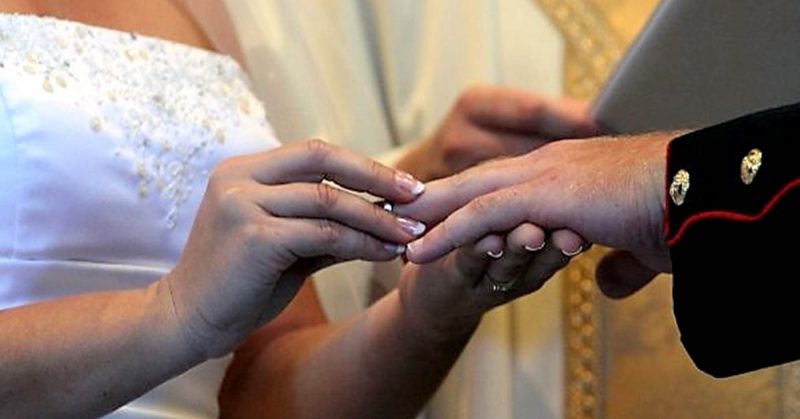In 2020, COVID-19 changed many aspects of our lives, affecting the way people went to work, sent kids to school and got their groceries. For many engaged couples, it also affected their options for getting married. With quarantine restrictions and remain-in-place orders, service members who planned to get married were prevented from traveling home for the ceremony. Some couples delayed their wedding dates, others looked into the option of a proxy marriage.
Weddings by proxy used to be reserved for people in prison, or for service members who were deployed overseas. They have now become a viable option for military couples living in different states who cannot reach each other due to travel restrictions. Now you can learn more about proxy marriages, where they are allowed and how they can work for you.
What is a proxy marriage?
When both members of a couple cannot physically be in the same place at the same time for a marriage ceremony, they can remain at a distance and have someone stand in as a “proxy” for one or both parties. A civil servant such as a minister, judge or justice of the peace can issue the marriage license and perform the ceremony, while the stand-in, who has a power of attorney, will recite the vows on behalf of the missing person. A proxy marriage is legally binding for both parties in states where it is recognized. Afterwards, the missing individual will receive an email notification that they are married. If one party is missing, it is a proxy marriage. If both individuals are not present, it is called a double-proxy marriage.
A proxy marriage is sometimes used for deployed service members who want to have their marriage legally finalized before returning to the States, so they can apply for base housing or begin receiving health care coverage for their new spouse. A legal marriage will also ensure that the spouse will receive benefits if the service member is injured or killed in action. Proxy marriages may also be an option for military couples living in different states if the service member cannot get leave approved to travel to their fiancé (or fiancée) for a wedding ceremony.

A friend of mine who became a military spouse in 2020 via a double-proxy ceremony, had her dress and shoes picked out for a traditional wedding ceremony, but the coronavirus pandemic delayed their wedding date twice. She was unable to visit her service member stationed at Fort Irwin, California because base requirements said visitors needed to be married. The couple was disappointed they couldn’t share their ceremony with friends and family, but finally requested a proxy wedding because they didn’t want to continue being apart for long periods of time.
What are the rules for a proxy marriage?
If you and your loved one are considering a proxy wedding, do your research first and make sure you are informed of the rules and limitations. If either party is not a United States citizen, you must follow immigration law, which typically does not approve proxy marriages.
The biggest limitation is that proxy marriages are not available in all states. Currently, you can apply for a proxy marriage in Texas, Colorado, California and Montana. In Texas, the person requesting the proxy marriage must be serving in the military and stationed outside the country. In Colorado, one party must be a Colorado resident and the service member must be stationed in another country or state. In California, a couple can only request a proxy marriage if the service member is currently deployed overseas. Their power of attorney must be witnessed and signed by two armed forces officers.
Currently, Montana is the only state that allows a double-proxy marriage. You do not need to be residents of Montana, as long as one person is active-duty military. Montana double-proxy weddings can be for same-sex couples. You can file paperwork remotely and pay for your stand-ins and your marriage license. These will be legally binding and recognized in all states except Iowa, which does not recognize proxy marriages.
States may charge large fees for a couple to hire a proxy wedding service, which officiates or “solemnizes” the marriage. Fees can range from $500 to almost $1,000! But because this is the step that makes everything official, it’s important not to skip it.
Will the military recognize our proxy marriage?
Before pursuing a proxy marriage, make sure it will be recognized in your home state and in the state where the service member is currently stationed. Each state has different laws about recognizing proxy marriages that were performed elsewhere. Some states will recognize them as full, legal marriages. In other cases, they will be treated as a common-law marriage. It’s important for the service member to check with their chain of command for local rules and regulations.






Proxy marriage is only legal in Kansas and Montana.
The proxy legally represents the absent person, allowing the marriage to take place. You have the option of getting married over the phone or over the Internet.
My friend had a double proxy marriage performed by an officiant in Kansas, while she was in Oklahoma and her”spouse” is in an Oklahoma prison. It’s not been consummated and I don’t believe it’s valid. She stated it was a COVID rule they married under. He’s threatening her life now and I think she can argue the validity or get annulment?
Hi, Linda Kay. If you feel like your friend is in crisis now, we urge you to please text or dial the Military Crisis Line at 800-273-8255 (option 1) at any time to speak with someone immediately.